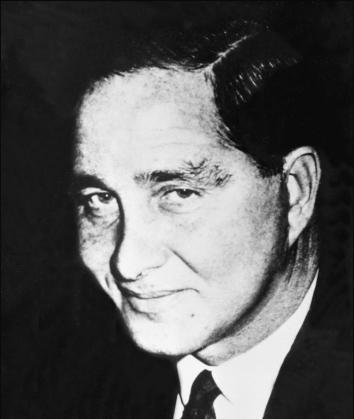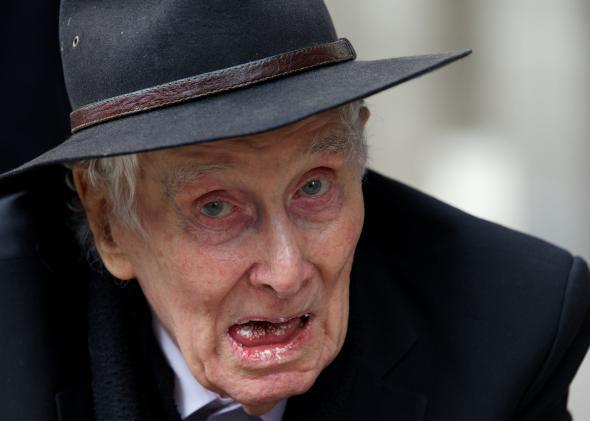Ronnie Biggs, the last of the international criminal folk heroes, has died at 84. Biggs was one of the least important members of the British super-gang that stole approximately 2.6 million pounds—worth about $60 million today—from a Royal Mail train in 1963, a heist that was later dubbed the Great Train Robbery. But he was certainly the most famous, thanks to his daring escape from prison in 1965 and his subsequent getaway to Brazil, where he lived for decades, trading on his infamy and thumbing his nose at British authorities. His success at skirting capture earned Biggs a reputation as one of Britain’s master criminals. But the truth about Ronnie Biggs never quite lived up to the legend.
Biggs was a Royal Air Force washout and petty criminal when he met a man named Bruce Reynolds in 1950 while both were serving time in Lewes Prison. Reynolds was an articulate charmer who dreamed of big, memorable heists. The two men became friends, and, according to Colin MacKenzie’s book Biggs: The World’s Most Wanted Man, it was in Lewes that Reynolds first told Biggs of his plan to one day rob a Royal Mail train. More than a decade later, Biggs, who had been working as a painter, was short on cash, and approached his old friend Reynolds for a loan. Reynolds countered Biggs’ loan request with a proposition: He was finally assembling a gang to pull the Royal Mail job, and he wanted to bring Biggs in on it.
Nobody else in the gang thought this was a good idea. The train robbery group was formed by merging two existing outfits: Reynolds’ South West Gang, and another crew called the South Coast Raiders. Both groups were made up of professional thieves who were experienced in big, complicated jobs. Biggs was an amateur, and, worse, a stranger to everyone but Reynolds. Consequently, he was assigned a very small role in the heist: Find an engineer to drive the train after it had been robbed. He failed miserably. Biggs recruited a friendly, overconfident retiree who had plenty of experience with older models of locomotives but had absolutely no idea how to operate the train being heisted. On the day of the robbery, the engineer proved useless, and he and Biggs were simply in the way.

Photo by STF/AFP/Getty Images
Despite having failed at the one job he had been assigned, Biggs received a full share of the robbery’s proceeds. Like most of the gang, however, he didn’t stay free long enough to spend it. The police discovered the train robbers’ hideout, which was covered in fingerprints, Biggs’ among them. He was arrested shortly thereafter, and sentenced to 30 years in prison.
He only served two years before escaping, in 1965, by scrambling up a rope ladder that accomplices had dropped over an exterior wall at Wandsworth Prison. Biggs made his way to Australia, where he lived in anonymity with his wife and family until 1969, when the police picked up his trail. Biggs moved on to Brazil alone, and Scotland Yard eventually caught up with him there, too, arresting him in 1974—but they were unable to bring him to justice. At the time of his arrest, Biggs’ Brazilian girlfriend was pregnant with his child, and the government of Brazil was loath to extradite the father of a Brazilian citizen-to-be. The British detectives went home empty-handed and Biggs remained a free man: the only known member of the Great Train Robbery crew who was still at large. He was a semi-celebrity in an equatorial paradise, a living refutation of the idea that crime doesn’t pay.
He traded on his notoriety for decades. As a known felon, Brazil granted Biggs provisional liberty, which meant, among other things, that he was not allowed to hold a job. He had to make money somehow, though, and he did so by entertaining visitors in Rio, who would pay to hear Biggs tell his story. “Stopping off at Ronnie Biggs’ house” became a standard part on any adventurous British tourist’s Rio itinerary. In 1978 members of the Sex Pistols came by, and together with Biggs, they wrote and recorded a song that went to No. 7 on the U.K. singles charts. “No One Is Innocent,” a hymn to the world’s “worthless creeps,” featured Biggs on warbly, off-key lead vocals, and a chorus that went “Ronnie Biggs was doing time until he done a bunk. Now he says he’s seen the light and he sold his soul to punk.”
As he aged, though, Biggs grew weary of life on the lam. He gave interviews asserting that his greatest wish was to “walk into a Margate pub as an Englishman and buy a pint of bitter.” In 2001, at age 71, out of money and in poor health, he took steps to make that happen, boarding a flight to Britain and voluntarily surrendering to police. If Biggs was expecting mercy due to his age and his ancient crime, he was mistaken: He was ordered to serve the remainder of his original 30-year sentence. For years, it looked like he would die in prison, as the British government resisted all calls to commute Biggs’ sentence. Then, in 2009, with Biggs’ health failing, the government suddenly reversed its position and set the train robber free, days before his 80th birthday. He lived out his remaining years a very sick man before dying early Wednesday morning.
Biggs liked to talk of himself as a “gentleman crook,” which was a self-serving and inaccurate description: He was no gentleman, and he wasn’t even much of a crook. What Biggs actually was is perhaps less important than what he represented. He was the guy who got away with it, and every generation needs someone like that. Frustrated salarymen could live vicariously through Ronnie Biggs, dreaming that they, too, might one day quit their job, rob a train, and escape to paradise.
